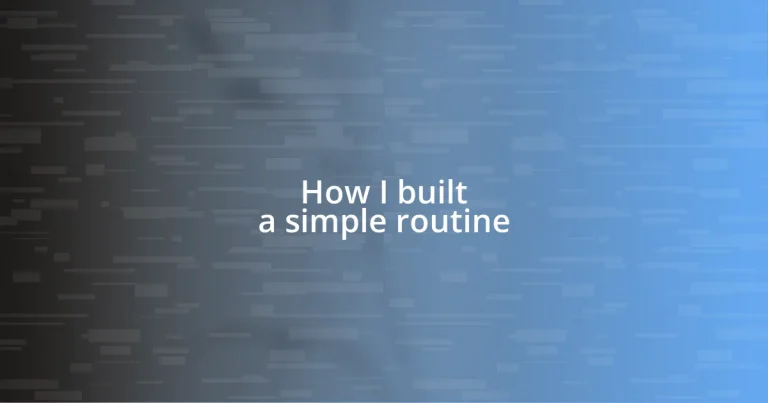Key takeaways:
- Establishing a daily routine reduces decision fatigue and promotes personal growth by prioritizing and structuring daily tasks around personal goals.
- Creating a flexible schedule allows for adaptability in life’s unpredictability while maintaining productivity; incorporating breaks and reflection aids in this process.
- Staying motivated involves celebrating small wins, managing challenges through a positive mindset, and seeking support from a community with shared goals.

Understanding the need for routines
Routines provide a sense of stability that many of us crave in our busy lives. I remember a period when my days felt chaotic, and I often found myself overwhelmed by a whirlwind of tasks. It struck me then—establishing a daily routine could transform my stress into structure. Why is that, I wondered? Having predictable patterns allows us to navigate our day-to-day with confidence.
Think about it: when I began incorporating simple routines, like morning stretches or dedicated work blocks, I noticed a drastic reduction in decision fatigue. It’s the small choices that can drain our energy. By creating a set routine, I conserved mental bandwidth and focused on what truly mattered. Have you ever experienced that moment when everything clicks, and you realize that the day feels more manageable? That’s the power of a well-structured routine at play.
Routines also foster personal growth and goal achievement. For me, embracing a night-time reading ritual not only enriched my knowledge but also helped me unwind. Can you recall how satisfying it is when regular habits contribute to your overall growth? It’s rewarding to see the cumulative effects of your efforts, reinforcing the idea that routines are not just boxes to check but pathways to improvement.
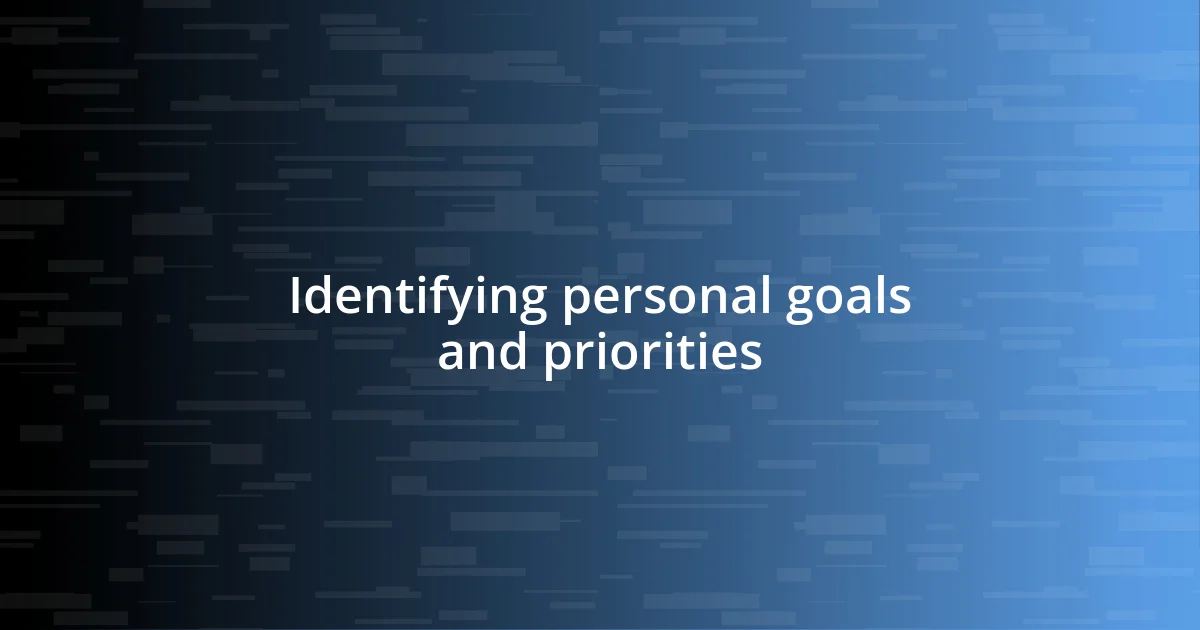
Identifying personal goals and priorities
Identifying personal goals and priorities sets the foundation for a meaningful routine. I recall when I first sat down with a journal to outline my aspirations. It was eye-opening to see my goals laid out clearly. Many of us get caught in the hustle, often forgetting what truly matters. Taking the time to reflect on my long-term intentions helped me prioritize daily tasks that align with those ambitions. Have you taken the time to write down what you genuinely want to achieve?
When I started defining my priorities, I noticed a significant shift in how I approached my days. Instead of feeling reactive to whatever came my way, I began to direct my energy toward the goals that excited me. For instance, I used to leave fitness on the back burner, but once I recognized its importance to my overall well-being, it found a place in my daily routine. This adjustment transformed my mindset, helping me feel more fulfilled and motivated.
This process of identifying goals isn’t just practical; it’s transformative. By categorizing my aspirations, I could distinguish between what was urgent versus what was essential. I created a simple template: one column for my goals, another for priority levels. Doing this not only clarified my focus but also provided a visual cue that kept me grounded. This way, every time I felt distracted, I could refer back and realign myself with my objectives.
| Goals | Priority Level |
|---|---|
| Health & Fitness | High |
| Career Development | Medium |
| Hobbies | Low |
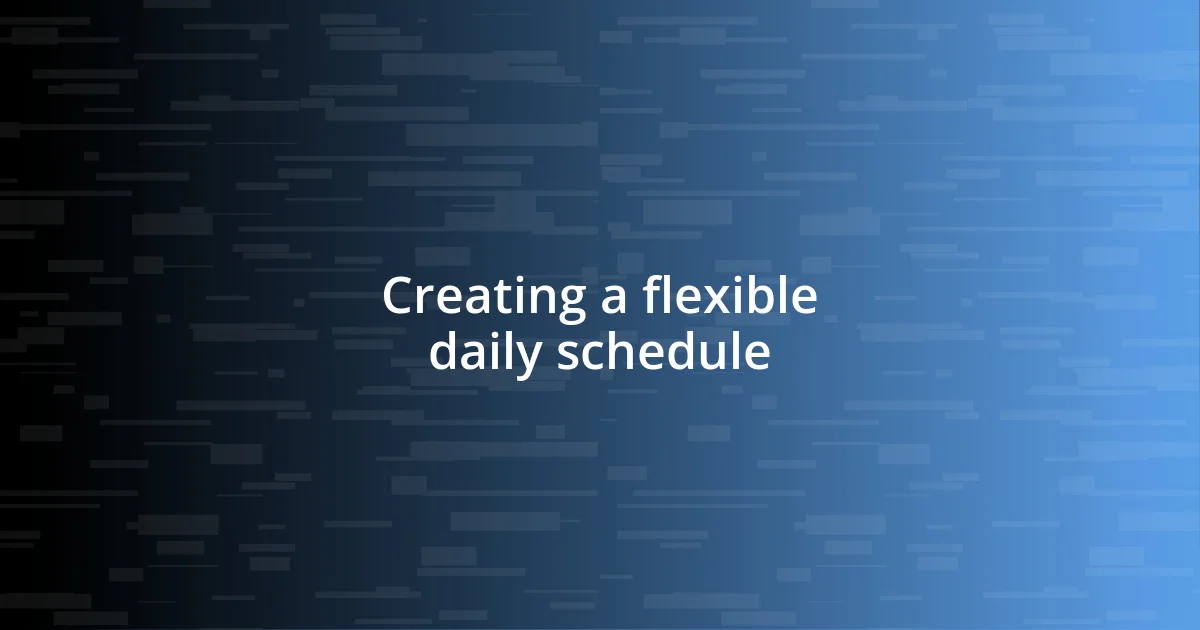
Creating a flexible daily schedule
Creating a flexible daily schedule begins with understanding that life doesn’t always unfold as planned. I remember days when my well-structured agenda crumbled under unexpected responsibilities. It was in these moments that I realized flexibility isn’t about throwing the schedule out the window but rather about adapting it to fit real-life circumstances. I started building in buffer times to allow myself the freedom to shift tasks without guilt or stress.
To help you craft your own flexible schedule, consider these key strategies:
- Prioritize essential tasks: Identify the most important activities that must get done.
- Block out time: Designate specific time slots for tasks but remain open to adjustments.
- Incorporate breaks: Regular breaks help recharge your mind, making adjustments easier.
- Use a digital calendar: This allows for quick rescheduling when needed.
- Reflect and adjust: At the end of each week, review what worked and what didn’t.
As I embraced this adaptive mindset, I’ve found that my daily routine became a living document—something I could change as needed while still remaining productive. Rather than feeling trapped by a rigid schedule, I learned to view it as a canvas on which I could paint my day, ensuring balance and responsiveness to life’s ebb and flow.
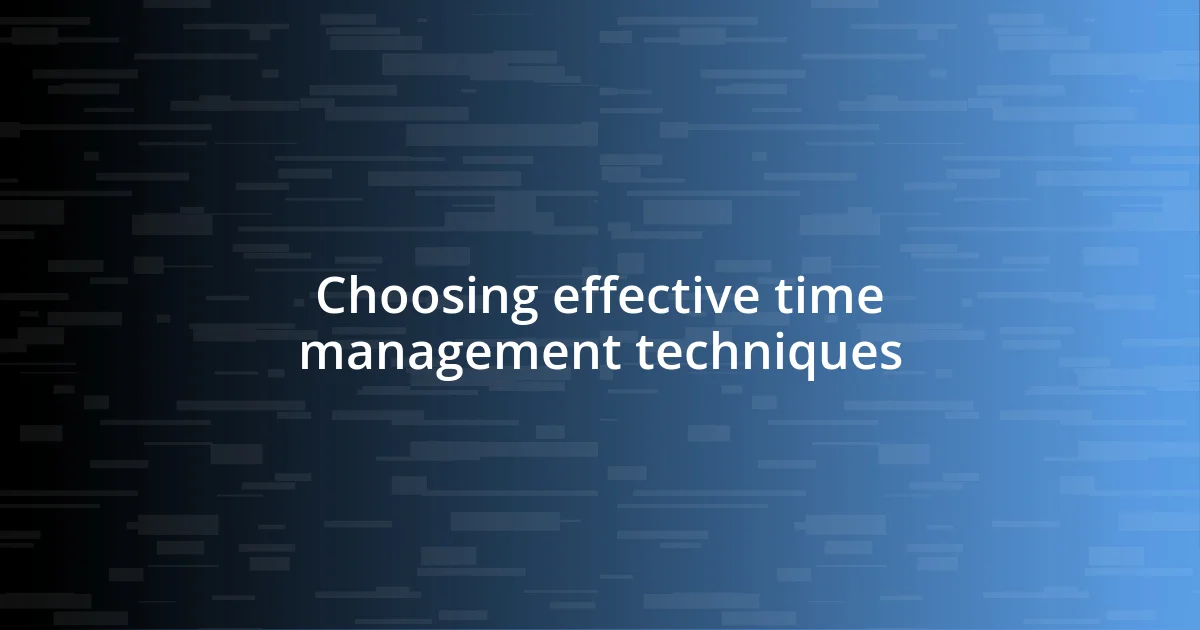
Choosing effective time management techniques
When it comes to choosing effective time management techniques, I’ve always found that aligning methods with personal habits is crucial. For instance, I struggled with lists for a long time. I’d write everything down, only to feel overwhelmed by the sheer number of tasks, which made me question, “Why am I even trying?” Eventually, I discovered that focusing on just three tasks per day brought clarity and purpose. This simple shift made my workload feel manageable and my progress tangible.
Another technique that worked wonders for me is the Pomodoro Method, which involves working for 25 minutes and then taking a 5-minute break. I remember the first time I implemented it—I actually felt my productivity soar! Rather than dragging through long hours at my desk, I embraced those short bursts of intense focus. It was surprisingly refreshing and kept my mind sharp. Have you ever tried breaking your work into chunks? You might be amazed by how it changes your approach to tasks.
Reflecting on my journey, I can’t help but emphasize the importance of personalizing these techniques. There’s no one-size-fits-all solution. Whether it’s experimenting with digital tools or trying analog options like time-blocking, I encourage you to pay attention to what feels right for you. When I found my rhythm, even mundane tasks started to feel lighter, and I was able to infuse my routine with enthusiasm and creativity. What’s your current approach to managing your time, and could it benefit from a little tweaking?
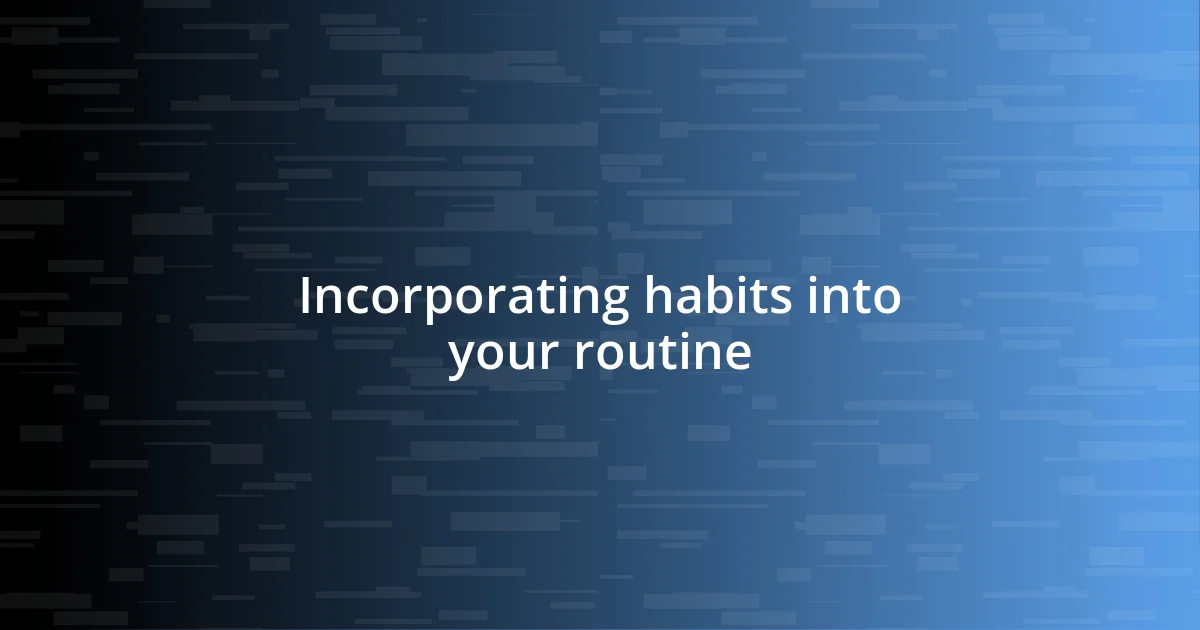
Incorporating habits into your routine
Incorporating new habits into your routine can feel daunting, but I’ve learned that starting small leads to lasting change. I remember the first time I wanted to integrate a daily meditation practice; I committed to just five minutes each morning. It was a manageable goal, and over time, those few minutes grew into a cherished hour where I felt truly connected to myself. Have you ever noticed how small changes can set off a ripple effect in your life?
One approach that worked for me was tying new habits to existing ones, a method I stumbled upon quite by accident. For example, I decided to practice gratitude every evening right after brushing my teeth. This small shift made the habit stick, as it built on something I was already doing without needing extra time or effort. Think about your daily rituals—how can you weave in new habits organically?
Tracking my progress became an essential tool for reinforcing these habits. I started using a simple app to record my daily meditation and gratitude practices. Each checkmark felt like a little victory, creating a sense of accomplishment. The emotional boost I received from this visible progress motivated me to keep going. Have you considered how tracking your habits might enhance your motivation? Making your efforts visible can really transform your relationship with your routine!
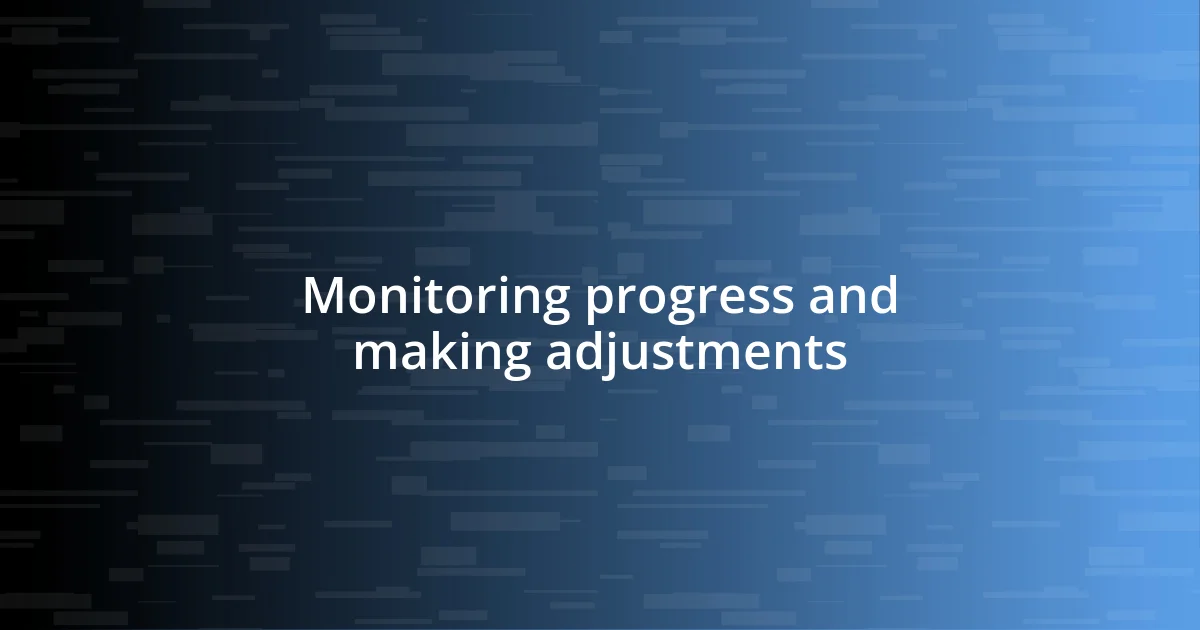
Monitoring progress and making adjustments
Monitoring my progress has become a game-changer in maintaining my routine. Early on, I printed out a simple checklist of my daily tasks. Each time I completed one, I experienced a small rush of achievement. It honestly felt like I was on a treasure hunt—every tick was a prize that fueled my motivation. Have you ever felt that thrill from checking something off your list?
As I spent more time with my routine, I realized that simple adjustments were key to keeping things fresh. For instance, I noticed that my energy dipped around 3 PM, making it tough to focus. So, I restructured my day to tackle more demanding tasks in the morning, saving lighter duties for the afternoon. It was like flipping a switch! Don’t be afraid to try shifting your schedule around—what have you found works best for you?
Additionally, reflecting on my progress every week has been incredibly beneficial. I set aside time every Sunday to review what went well and what needed tweaking. This reflection not only illuminated patterns in my productivity but also highlighted areas for growth. It’s as if I had a personal coach guiding me through my routine. Do you think taking a moment to reflect could spark new ideas for enhancing your own daily practices?
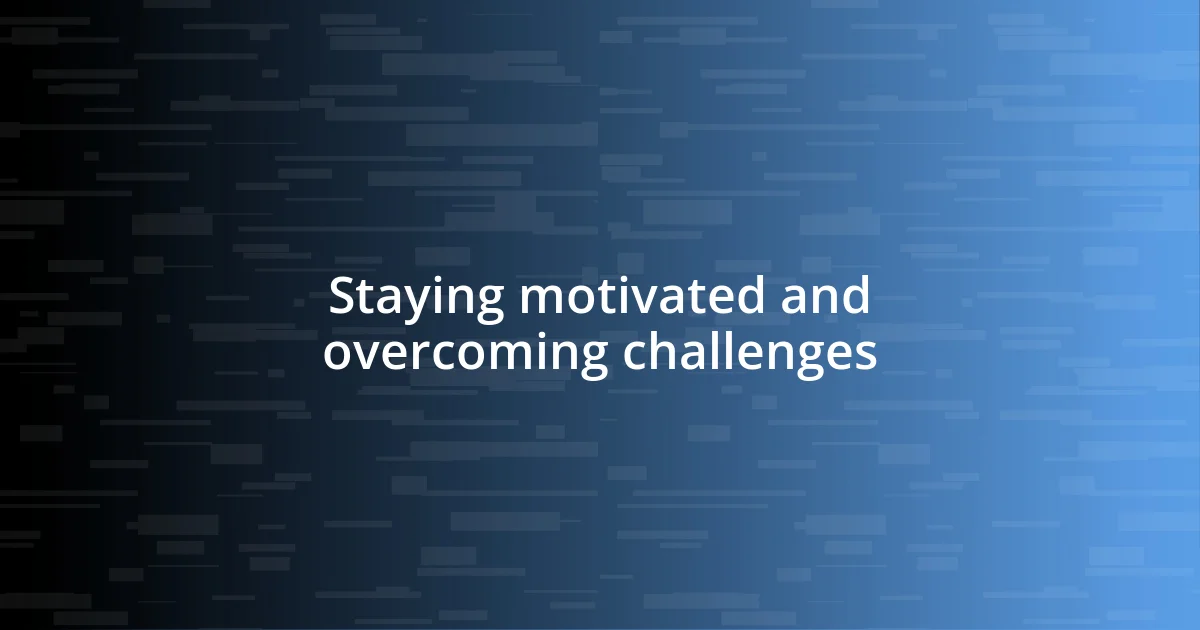
Staying motivated and overcoming challenges
Staying motivated can sometimes feel like climbing a mountain, especially when faced with challenges. I remember a particularly tough week when life threw unexpected curveballs my way. Instead of letting setbacks derail me, I began to focus on small wins—like sticking to my morning routine or completing a workout. Celebrating these minor victories fueled my perseverance, proving that motivation is often found in the little things. What small successes have you found that keep your spirit up during tough times?
Overcoming obstacles is often about mindset. One time, I hit a wall with a project that felt overwhelming. Instead of seeing it as an insurmountable task, I reframed my thinking: what if I broke it down into bite-sized pieces? By approaching it one step at a time, I not only made progress but also regained a sense of control. It’s fascinating how changing your perspective can transform challenges into manageable tasks, isn’t it?
I’ve also learned the importance of surrounding myself with a supportive community. Connecting with friends who share similar goals motivated me to push through when I felt stuck. We would share our struggles and triumphs, reminding one another that challenges are part of the journey. Have you ever found that encouragement from others can reignite your drive? It’s a powerful reminder that we’re not alone in our pursuits.












